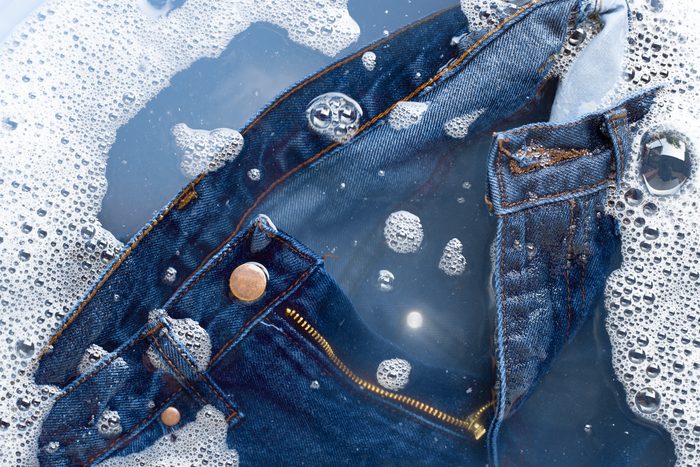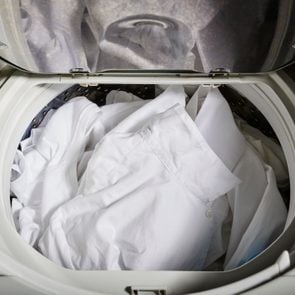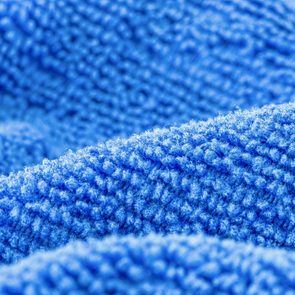How Often Should You Wash Your Jeans?

Yes, there is a correct number! Here’s what experts say about how frequently you should wash jeans to keep them in tip-top shape.
Our editors and experts handpick every product we feature. We may earn a commission from your purchases.
Jeans are very possibly the most perfect, most versatile wardrobe item ever created. And when we find the perfect pair, we want to keep them in tip-top shape for as long as possible. You might think that entails washing them frequently, but some experts swear you should never wash them at all. (Seriously, not ever.) And still other laundry experts say you should stick them in the freezer for the best results. But what’s the truth? How often should you wash jeans?
Cleaning experts agree that towels, sheets and pillows should be tossed in the wash after a very specific amount of time. But how often to wash jeans is a fiercely debated topic, though most experts agree that less is more. “Denim is such a durable fiber, and as such, it doesn’t require a lot of washing,” explains Adam Taubenfligel, co-founder of Triarchy, a sustainable denim company. However, there are a lot of factors that can change the “correct” number of times you can wear jeans without washing them.
Here’s exactly what you need to know about how often to wash your jeans and how to do it right, from choosing the right water temperature to using the best detergent. This advice just may change everything you think you know about how to do laundry.
How often should you wash jeans?
First things first: Generally speaking, you shouldn’t wash your jeans after every wear. It’s not necessary, and it can actually cause them to break down faster. Instead, a good guideline is to wash them between every three to ten wears. Determine the exact day to wash “based on how they feel, look and smell,” says Rowan Page-Brennan, marketing coordinator for Indigo Wild, the maker of Zum laundry soap. And, of course, if they’re covered in mud, food, motor oil or whatever else, wash them pronto, utilizing these tips on the best ways to get rid of stains.
The main issue, aside from spills and stains, is sweat, which means the weather and your activity level will play a role in how often you wash your jeans. Here’s a good rule of thumb: If you’re not sweating in them and they smell clean, it’s OK to hold off. The moment your nose alerts you to an issue, it’s time to wash them, even if you’ve only worn them once. An odor means that bacteria is percolating in your pants, and it can eat away at the fabric. Plus, that isn’t great for your skin either. (More on that below.)
Does the material make a difference in how often you should wash jeans?
Jeans are made two ways: with rigid denim (aka 100% cotton) or stretch denim, which is a cotton and Lycra or spandex blend. Washing rigid denim, in particular, will affect the fit, so it boils down to personal preference. “Rigid denim will open up and loosen slightly with wear, so some people like to wash their rigid denim after a few wears to tighten the weave,” says Sarah Ahmed, co-founder and chief creative officer of DL1961. “On the other hand, stretch denim is made to retain its shape even after many wears, so the only reason you would wash your stretch denim jeans is if they were dirty past the point of spot cleaning.”
As for light-colored or white jeans, the same rules apply. “While light-colored jeans might need a little extra care to keep them looking their best, that doesn’t mean they need to be washed more than dark jeans,” says Shawn Ashby, Whirlpool’s laundry brand manager. Instead, spot-treat small stains whenever possible instead of automatically tossing your jeans in the wash.
Is it bad to wash your jeans often?
It’s definitely not great. Denim may feel like a tough fabric, but washing jeans too frequently can change the fit and color. “The more you wash anything,” says Taubenfligel, “the more you wear the fibers down and reduce the life span of the garment. Only wash them when truly necessary.”
Ahmed agrees, adding, “Washing less preserves the natures of the fibers, elongating the life of your jeans. Stay away from doing frequent washes—it’s about being more mindful.”
What happens if you don’t wash your jeans?
There’s a small group of people—including Levi Strauss CEO Chip Bergh and Posh Spice herself, Victoria Beckham—who say they never wash their jeans. They wear them on repeat until they get tired of them, and hang them to air them out. Others swear by freezing them, placing them in a zippered baggie and letting them “cook” for 48 hours in the freezer to clean them.
The main issue in both of these scenarios? Bacteria and sloughed-off skin sticks to jeans, which—yep—is as gross as it sounds. Back in 2011, Julie Segre of the National Human Genome Research Institute told Smithsonian Magazine that freezing jeans wouldn’t kill bacteria, and of course, it wouldn’t get rid of dirt either. In case you were wondering, it’s the combination of oils, bacteria, food, dirt and dead skin that come together and create that instantly recognizable “whiffy” odor. Plus, all those ingredients settle into the fibers, breaking them down and ultimately weakening your jeans.
To see how dirty your jeans really are, look along the seams, thighs and seat of your jeans, suggests Mary Gagliardi, Clorox’s in-house scientist and cleaning expert, who’s also known as Dr. Laundry. That’s where dirt accumulates. She also warns that while you might be worried that too much washing will affect the color of your jeans, you’ll also run into problems when you don’t wash them enough. “The longer jeans go without washing,” she explains, “the easier it is for the soils on the surface to break down the dye and actually contribute to the fading.”
How to wash jeans
Every expert we spoke with agreed on the best way to wash jeans. But before you start, if you’re washing new or indigo-colored jeans, wash them separately the first time; otherwise, the excess dye could end up on your other clothing. After you’ve separated the necessary items, follow the step-by-step directions below.
- If needed, spot-treat stains. Make sure to read the care label on your jeans first, as well as the directions on the stain remover.
- Turn your jeans inside out. Doing this preserves their color.
- Set your washer’s temperature to cold. Cooler temperatures will help prevent shrinkage and fading.
- Select a gentle or delicate cycle, and use a gentle detergent. According to Gagliardi, a gentle cycle “reduces the rubbing and creasing of fabric that contributes to color loss.”
- Opt for an extra rinse cycle. Denim is a porous fabric and absorbs liquids quickly, so this will ensure that the detergent is completely washed out.
Use these same steps for washing light-colored and white jeans. While it’s tempting to use bleach to keep white jeans white, don’t. “It’s important to avoid both bleach and fabric softener when washing white jeans,” stresses Ashby. “Bleach can cause yellowing and damage to the fabric.”
How to dry jeans
Experts say the best way to keep jeans looking their best is to air-dry them. “It’s always a good idea to keep jeans out of a hot dryer to prevent fading and shrinkage,” notes Gagliardi. “Hanging them to dry will help preserve their color.” Jeans should be either hung by the waist on a clip hanger or placed on a drying rack to air-dry.
If jeans need to be tossed in the dryer, use low heat or the permanent-press cycle. The higher the heat of the dryer, the bigger the chance that jeans will shrink and fade and that the fabric, especially if it has any stretch, will break down. Toss wool dryer balls into the dryer too. They can shorten the time it takes to dry jeans, prevent static cling and soften clothing.
But whatever you do, don’t use dryer sheets with your jeans. The chemicals will coat the fabric, and after prolonged use, this will make it harder to get them clean, since they’ll be coated in chemicals. Plus, the chemical film can build up and weaken fabric over time, not to mention potentially cause health issues.
How do I take care of my jeans?
- Follow the directions on the care label. Those directions and accompanying laundry symbols will tell you whether your jeans need to be washed on a certain cycle or if you shouldn’t use steamers or irons.
- Don’t dry-clean them. The chemicals that dry-cleaners use can be too harsh for cotton fabric. Over time, they can weaken jeans. The only time your denim should go to a dry cleaner is if it has special details like beading, stone or additional fabrics. In this instance, Taubenfligel advises, “seek out a green dry cleaner that uses enzymes over chemicals.”
- Use a gentle detergent. This will prevent damage to the fabric.
- Hang flare, bootcut and wide-leg jeans to retain their shape. Using clip hangers, hang the jeans by the waist so that the bottoms of the jeans will drape the same way they do when worn. Jeans made with delicate materials such as linen, cotton poplin, eyelet or silk should be hung to prevent wrinkles. If they have interior fabric loops (called “keepers”), they should be hung on a hanger; place the loop through the hanger notches found on either side of the hanger, and then place them on the rod. Skinny or straight jeans can be folded and placed on a shelf of a closet or dresser drawer.
- Repair damage ASAP. A damaged hem, if left untreated, will keep incurring damage, slowly creating a bigger hole over time and ultimately making the jeans unwearable. A quick fix right away can prevent that. Next, learn how often you should wash your bra.
Sources:
- Adam Taubenfligel, co-founder of Triarchy
- Rowan Page-Brennan, marketing coordinator for Indigo Wild, the maker of Zum laundry soap
- Sarah Ahmed, co-founder and chief creative officer of DL1961
- Shawn Ashby, laundry brand manager for Whirlpool
- Smithsonian Magazine: “The Myth of the Frozen Jeans”
- Mary Gagliardi, Clorox’s in-house scientist and cleaning expert












